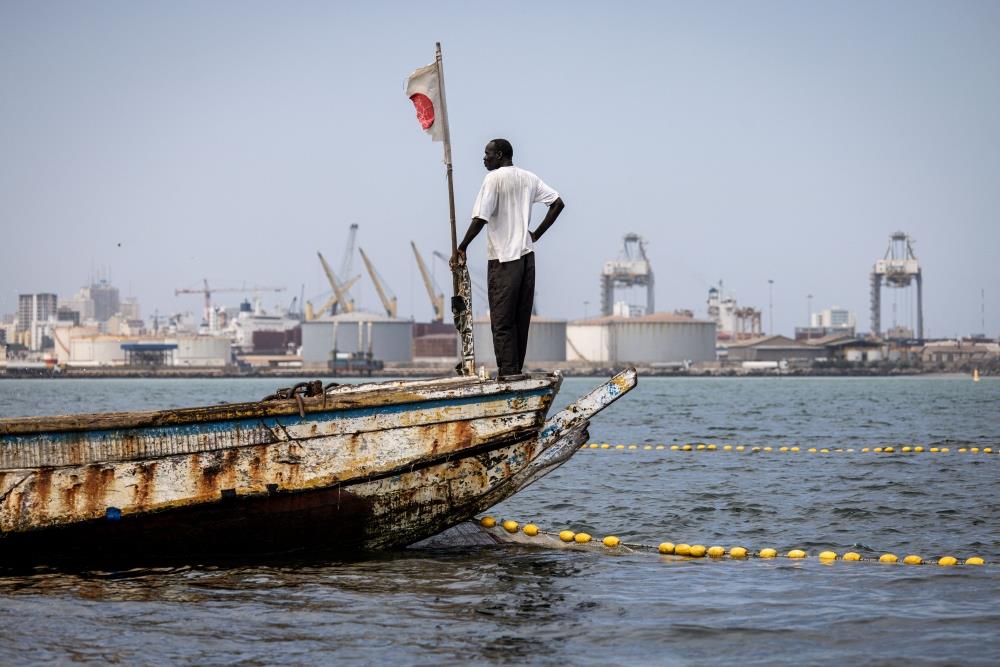Lure Of Migration Snares Senegal's Fishermen
Thiaroye, Senegal: These days, when a Senegalese fisherman climbs into a canoe, it's likely to be the last time -- either he is leaving his life behind in hope of a new one in Europe, or failing in the attempt.
Small-scale fishing has long been a mainstay of Senegal's economy and its communities along the Atlantic coast, but over-fishing, industrial competition and the impacts of climate change are taking their toll.
"These young guys behind me, when we're at sea all they talk about is going to Europe," said Ibrahima Diouf, a solidly-built fisherman in his 40s, pointing to the six crew members getting his boat ready in Thiaroye, outside the capital Dakar.
He pointed to a dozen other boats lying on the beach, saying they'd been abandoned by colleagues who left for Europe "because there are not enough fish, they can no longer make a living".
In recent years thousands of Senegalese have embarked in the narrow wooden canoes, some reaching 20 metres (65 feet) long, and carrying dozens of passengers paying several hundreds of dollars each to traffickers.
It's a huge price for a dangerous trip of 1,500 kilometres (around 930 miles) and over a week toward the Canary Islands of Spain, their gateway to the European Union.
Nearly every day in cities and towns across Senegal, people hear about a successful venture, a boat stopped by coastguard interceptions -- or capsized ships.
But that has not deterred a growing number of fishermen to join the ranks of those hoping to leave, usually young people fleeing poverty and unemployment.
"Today you also have women and children, and people with jobs. Fishermen are the new ones," said Boubacar Seye, president of the migrant NGO Horizons Without Borders.
Less to catch
"Almost everyone here has left," said Ababacar Diop, a married father of two in his 30s, who himself tried to make the crossing but was picked up and returned by Senegal's navy in October.
"We've gotten used to coming back empty-handed" from fishing trips, he said, blaming the lost catches on "these trawlers behind me".
At anchor are dozens of hulking fishing boats, some with Senegalese flags, many others with Chinese or other foreign flags.
Most are hauling in hake, sole, shrimp or octopus mainly to meet the demands of European consumers, or to supply fishmeal or oil producers, the Environmental Justice Foundation said in a recent report.
"A few years ago, we would set out at 6 am and return around 5 or 6 pm," Diop said. "These days we're forced to return at 10 or 11 am" because there's nothing to catch.
Fishing provides around 600,000 direct and indirect jobs for Senegal and 3.2 percent of its GDP, according to a 2022 report from the US Department of Agriculture.
But for the tens of thousands still trying to catch sardinelle, mackerel or scad, "heading out to fish is a losing proposition", said Aliou Ba, head of ocean campaigns for Greenpeace Africa.
"This craft is dying," he said.
Losing hope
Senegal's fishing exports nearly quadrupled between 2008 and 2018, according to the Environmental Justice Foundation, even though more than half the stocks of species in nearby waters are facing "collapse".
Meanwhile, catches by small-scale fishermen in canoes plunged by 58 percent from 2012 to 2019.
The diminished prospects help explain why Senegalese are now alongside Moroccans as the most numerous migrants to reach the Canary Islands this year, according to Spanish NGOs and the EU's Frontex border agency.
AFP could not obtain overall statistics on the migrant numbers, nor the number of Senegalese intercepted on the Canary Islands route.
But most that AFP reporters spoke with on the islands in mid-October said they were fishermen or from a family of fishers, or from towns along Senegal's coast.
Senegal's navy said in late October that it had intercepted 26 canoes carrying a total of 3,800 migrants in just two weeks, Senegalese but also people from Gambia, Guinea or Mali.
An official at the Spanish embassy in Senegal acknowledged that "the arrival of fishermen is a new factor" with regards to the canoes landing on the southernmost Canary Island of El Hierro.
Dozens of Senegalese have drowned on the route that has seen 633 deaths overall this year, according to the International Organization for Migration.
For Ba at Greenpeace, more fishermen are leaving for the simple reason that they have the means to do so.
"If the fishermen decided they weren't going to leave, nobody would be able to leave," he said.
But for those like Diop, whose first attempt was thwarted, a chance to leave for Europe is too tempting to refuse.
"If I had a little bit of hope in fishing, I would never have tried to reach Spain by canoe," he said.

Legal Disclaimer:
MENAFN provides the
information “as is” without warranty of any kind. We do not accept
any responsibility or liability for the accuracy, content, images,
videos, licenses, completeness, legality, or reliability of the information
contained in this article. If you have any complaints or copyright
issues related to this article, kindly contact the provider above.
Most popular stories
Market Research

- Brazil Edtech Market Size, Share, Trends, And Forecast 2025-2033
- Vietnam Vegan Food Market Size, Share, Trends And Report 2025-2033
- Cryptogames Introduces Platform Enhancements Including Affiliate Program Changes
- Accounting And Bookkeeping Service Business Plan 2025: How To Start, Operate, And Grow
- USDT0 And Xaut0 Are Now Live On Polygon
- Global Open Banking Market 20252033: Services, Deployment & Distribution Trends






















Comments
No comment